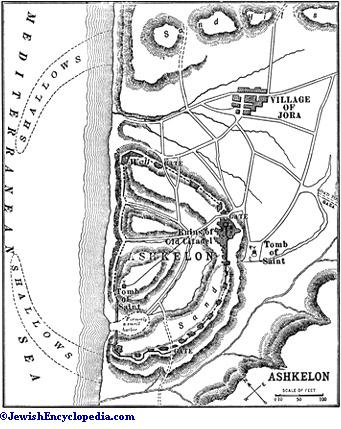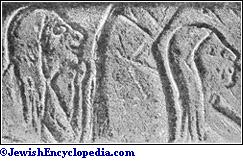Ashkelon
 From Jewish Encyclopedia (1906)
From Jewish Encyclopedia (1906) Ashkelon:
City on the southern coast of Palestine. It occurs in Egyptian texts twice as "Asḳaruni," among the cities revolting against Rameses II. (see illustration, p. 192) and Meneptah; in the El-Amarna tablets, the prince Yitia of Asḳaluna is mentioned as being obedient to Egypt. Ashkelon never seems to have been in the hands of the Israelites, though hard pressed by Samson (see Judges xiv. 19; I Sam. vi. 17; Josh. xiii. 3; II Sam. i. 20, etc.). In Judges i. 18, it is stated that "Judah took Ashkelon with the border thereof"; but this statement is in contradiction to the Septuagint, in which the verse states what Judah "did not take."
The Assyrians frequently mention Isḳaluna (or Asḳaluna). Tiglath-pileser II. subjected it, and about 732

According to Scylax ("Periplus"), the Tyrians held Ashkelon in the Persian time. Although thoroughly Hellenized, it surrendered twice easily to Jonathan the Maccabee (I Macc. x. 86, xi. 60), and later to Alexander Jannæus. Strabo (vii. 59) still calls it "a small city." Herod the Great, who, according to some traditions (Justin, "Dialogus cumTryphone"), was born in Ashkelon, embellished it considerably, and his sister Salome resided there (Josephus, "B. J." ii. 6, § 3). In the great revolution, the Jews seem to have attacked it without success (contrast "B. J." ii. 18, § 1, with iii. 2, § 12). The most flourishing period of Ashkelon was during the later division of the Roman control, when it was a free republic (Pliny, "Hist. Nat." v. 68), famous for the literary taste ruling there. Ammianus Marcellinus, xiv. 8, 11, speaks of it as a considerable place. In the Crusades its possession passed frequently into the hands of the Christians and the Moslems alternately (1154, 1187, 1192). Since its demolition in 1270 it has remained a ruin. Whether the extensive ruins of the medieval "Ascalon," west of the village El-Jôra, cover exactly the site of the ancient city or only the portion referred to as "Ascalon" Maiumas—that is, the suburb with the so-called port—is an open question. Ptolemy's statement (v. 16, 2; viii. 20, 13) that it was a maritime city may be understood as broadly as in the case of several neighboring cities. The site of Ashkelon proper is placed by some scholars near the village El-Mejdel, northwest of Asḳalân. It may be mentioned that the onions of Ash kelon, famous in antiquity (Strabo, Stephen Byzantinus), still grow wild on the fertile spot ( see Philistines ).

- Memoirs of the Survey of Western Palestine, vol. iii., sheet 16;
- Guthe, in Zeit. Deutsch. Paläst. Ver. ii. 164 et seq. For rabbinical references: H. Hildesheimer, Beiträge zur Geographie Palästinas, pp. 1 et seq.
Categories: [Jewish encyclopedia 1906]
↧ Download as ZWI file | Last modified: 09/04/2022 17:58:17 | 2 views
☰ Source: https://www.jewishencyclopedia.com/articles/1949-ashkelon.html | License: Public domain
 ZWI signed:
ZWI signed: KSF
KSF